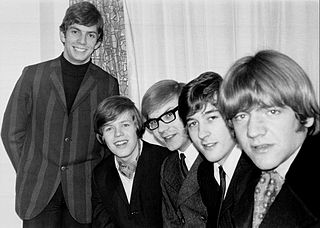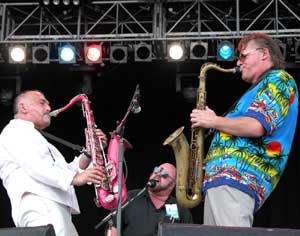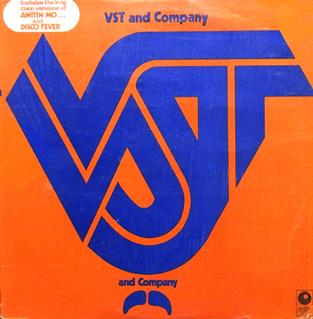
Tom Petty and the Heartbreakers were an American rock band from Gainesville, Florida. Formed in 1976, the band originally comprised lead singer and rhythm guitarist Tom Petty, lead guitarist Mike Campbell, keyboardist Benmont Tench, drummer Stan Lynch and bassist Ron Blair. In 1982, Blair, weary of the touring lifestyle, departed the band. His replacement, Howie Epstein, stayed with the band for the next two decades. In 1991, Scott Thurston joined the band as a multi-instrumentalist—mostly on rhythm guitar and second keyboard. In 1994, Steve Ferrone replaced Lynch on drums. Blair returned to the Heartbreakers in 2002, the year before Epstein's death. The band had a long string of hit singles including "Breakdown", "American Girl", "Refugee", "The Waiting", "Learning to Fly", and "Mary Jane's Last Dance", among many others, that stretched over several decades of work.

Herman's Hermits are an English rock and pop group formed in 1964 in Manchester and fronted by singer Peter Noone. Known for their jaunty beat sound and Noone's often tongue-in-cheek vocal style, the Hermits charted with numerous transatlantic hits in the UK and in America, where they ranked as one of the most successful acts in the Beatles-led British Invasion. Between March and August 1965 in the States, the group logged twenty-four consecutive weeks in the Top Ten of Billboard's Hot 100 with five singles, including the two number ones "Mrs. Brown You've Got a Lovely Daughter" and "I'm Henry VIII, I Am". Their other international Sixties hits include "I'm into Something Good", "Can't You Hear My Heartbeat", the two covers "Silhouettes" and "Wonderful World", "A Must to Avoid", "There's a Kind of Hush", "I Can Take or Leave Your Loving", "Something's Happening" and "My Sentimental Friend", all of which were produced by Mickie Most. They also appeared in four films, two of which were vehicles for the band, including Hold On! (film) in 1966.

David Gilmour is the debut solo studio album by Pink Floyd guitarist and co-lead vocalist David Gilmour, released on 26 May 1978. The album reached number 17 in the UK and number 29 on the Billboard US album charts; it was certified Gold in the US by the RIAA. The album was produced by Gilmour, and consists mostly of blues and guitar-oriented rock songs, except for the piano-dominated ballad "So Far Away".

Peter Derek Kircher is a retired English rock/pop drummer. He was the drummer for Honeybus (1967-1970), Liverpool Express (1978-1979) and Original Mirrors (1979-1981). Between 1981 and 1985 he was a member of Status Quo, performing with the band at Live Aid and on the albums Back to Back and Live at the N.E.C..

Swing Out Sister are a British pop group best known worldwide for the 1986 song "Breakout". Other hits include "You On My Mind", "Twilight World", "Waiting Game", and a remake of the Eugene Record soul composition "Am I the Same Girl?"
Subway Sect were one of the first British punk bands. Although their commercial success was limited by the small amount of recorded material they released, they have been credited as highly influential on the Postcard Records scene and the indie pop genre which followed.

Killers is the second compilation album by American hard rock group Kiss. It was released only outside the US, but quickly became available as an import. Of the album's twelve songs, four were new compositions recorded specifically for it: "I'm a Legend Tonight," "Down on Your Knees," "Nowhere to Run" and "Partners in Crime." These new songs were recorded at the behest of Phonogram, in response to the commercial failure of 1981's Music from "The Elder".

"The Beat Goes On" is a song written and composed by Sonny Bono and recorded by Sonny & Cher. It was issued as a single and appeared on their 1967 album In Case You're in Love. It entered the Billboard Hot 100 chart on January 14, 1967, peaking at number six.
Mayonnaise are a five-piece Filipino alternative rock band, fronted by Monty Macalino and famous for winning the "Red Horse Muziklaban" contest in 2004.
VST & Company was a Filipino disco band from Manila, Philippines, founded by Vic Sotto, Spanky Rigor, and Tito Sotto. Hailed as one of the most successful Filipino bands of the late 1970s, the group is considered by many to be one of the original proponents of OPM. The band originally consisted of Spanky Rigor, Roger Rigor, Male Rigor, Celso Llarina, Monet Gaskell, Val Sotto and Jun Medina. They pioneered the Manila sound genre along with bands such as Hotdog and Cinderella, and rose to fame with their first hit song, "Awitin Mo at Isasayaw Ko". The song ignited Philippine disco culture, and sparked "VST Mania"; a craze that swept across the country throughout the late 1970s. Their five albums which host a catalogue of hits such as "Rock Baby Rock", "Swing It Baby", "Disco Fever", "Magsayawan", "Kiss Kiss", "Magnifica" and "Step No, Step Yes", plus three critically acclaimed full-length films, Disco Fever (1978), Swing It… Baby (1979) and Rock Baby, Rock (1979), hallmark the band's cultural influence and historical contributions to contemporary Philippine pop music.

Jo Jo Zep and the Falcons are an Australian blues and rock band that features the singer, songwriter and saxophonist Joe Camilleri. The band was active in the late 1970s and early 1980s, and had several Australian chart hits including "Hit and Run", "Shape I'm In" and "All I Wanna Do". The Falcons dissolved in 1981 and the group's biggest Australian hit, 1982's "Taxi Mary", as well as the New Zealand top ten hit "Walk on By", were both credited simply to "Jo Jo Zep". In 1983, Camilleri and other members of the Falcons formed the Black Sorrows.

Shapes and Patterns is the fifth studio album by British pop group Swing Out Sister. It was first released in Japan in March 1997 on Mercury Records, and in Europe and the United States the following year. Producer Paul Staveley O'Duffy, who co-wrote half of the songs on the album, was back at the helm. As an orchestra was once again employed, the lush arrangements characteristic of Kaleidoscope World (1989) resurfaced. The album features the track "Now You're Not Here" which was used as the theme to the Japanese programme Mahiru No Tsuki, as well as a reworked version of "Better Make It Better" which had featured on their previous studio album, The Living Return (1994). The album was promoted with the singles "Somewhere in the World" and "We Could Make It Happen."
Ramon Daniel Pennington was an American country music singer, songwriter, and record producer. He is known for writing the song "I'm a Ramblin' Man", and for founding the independent Step One Records label.
"Rock Baby Rock" is a song by Filipino disco group VST & Company, written by Vic Sotto. It is part of a medley called "VST Concerto in A Minor" on the album VST 3. It was one of the group's biggest hits produced by the band themselves. Sotto said in an interview on PTV's Xiao Time segment that it was his most favorite VST song because he put a lot of effort into it.

"Ikaw ang Aking Mahal" is a song by VST & Company. Its lyrics were penned by songwriter Joey de Leon while the music was composed by Tito Sotto and bassist Spanky Rigor. Released on their debut album VST, the ballad has been recorded by many other Filipino artists. The B-side, the disco number "Awitin Mo at Isasayaw Ko" is also one of the group's biggest hits. It is the last track on the group's debut album VST.

VST is the first studio album by the Manila sound group VST & Company, released in 1978. The lead vocalist, Vic Sotto, was not credited and does not even appear in the group's picture at the back of the album, but was thanked in the album credits along with Tito Sotto and Joey de Leon.

VST 3 is the fourth studio album by the Filipino group VST & Company. The back cover marked the second time on which lead singer Vic Sotto was included.
"Awitin Mo at Isasayaw Ko" is a disco song by the Filipino group VST & Company. Although released only as a B-side of the ballad "Ikaw ang Aking Mahal", it is one of group's biggest hits in the country. The lyrics were penned by Joey de Leon and its melody by Vic Sotto and arranged by Lorrie Illustre. Recorded at Cinema Audio in 1978.
"Magsayawan" is a song recorded by the Filipino disco group VST & Company, written by the songwriting team of Charo Unite and Ernie dela Peña. It was one of the group's biggest hits in the Philippines and was the only hit single not written by the group's principal songwriters, Vic Sotto and Joey de Leon.
Patrick Gammon was a singer-songwriter and musician based in Munich. Gammon played piano with Ike & Tina Turner for two years. He later recorded as a solo artist and worked as a session musician in Germany. In the 1970s, Gammon co-founded the company Gammarock Musik.












